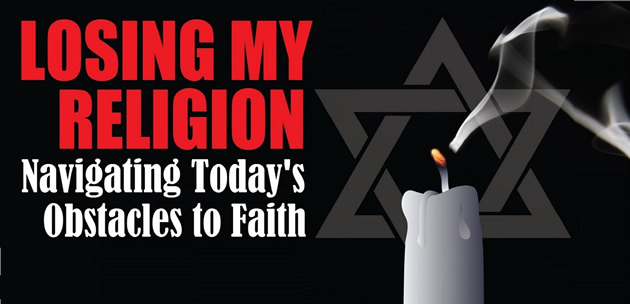It wasn’t always this easy to be a Jew in a Christian country. In the 21st century, the Church’s age-old desire for the soul of the Jew can only find expression in the realm of the discussion. One of the few weapons that remain in the arsenal of the missionary is the scriptural argument. This same weapon is readily turned against the missionary by the Jew who has studied the scriptures.
It was not always this way. There were times when the most intense pressures were brought to bear against the Jew. The Church had the Jew confined to cramped ghettoes, the Jew was stripped of most civil rights and the threat of death was an ever-present reality in the life of the Jew. Death could come at the hands of a mob whipped to hysteria by the preaching of the moral lights of Christendom. Or it could come in the formal deliberations of the ecclesiastical judges, who sentenced multitudes to death for the imagined desecration of a holy wafer.
The Psalmist prophetically gave voice to those who endured the dark centuries of cruelty. In the words of the Psalmist, the eternal Jew speaks to God – “All this has come upon us and we have not forgotten You, and we have not been false to Your covenant. Our heart has not turned back, nor have our footsteps strayed from Your path. Even when you have crushed us in the place of jackals, and shrouded us in the shadow of death, have we forgotten the name of our God and extended our hands to a strange god? Would not God search this out? For He knows the secrets of the heart. But for Your sake we are killed all the time, we are considered as sheep for slaughter.” (Psalm 44:18-23)
These divinely inspired words can help us see into the spirit of the eternal Jew. The ultimate purpose of the Church campaign is to turn the Jew’s heart towards the founder of Christianity. But the Jew’s heart is directed towards his God and will not turn back. The Jew’s unswerving loyalty to God does not allow him to extend his hand to a strange god. There is no room in the heart of the Jew for the devotion that the Church is promoting.
At the Jew’s insinuation that veneration of the Nazarene is idolatrous, the missionary campaign moves into high-gear. With righteous indignation the missionary argues; “We Christians are not making a man into God, we believe that God became man”. Another argument advanced by the missionary claims that “The Nazarene is the living incarnation of the true God”. The missionary expects these platitudes and others like them to convince the Jew that Christianity is not idolatry. When these nimble aphorisms fail to persuade the Jew, the missionary is smug in the presumption that it is the Jew’s prejudice that prevents him from appreciating the fine nuances of these sophisticated arguments. The missionary is satisfied that the reasoning he presented settled the issue for good and all, and the Jewish charge that belief in the trinity is idolatrous can be dismissed.
What does the Jew say? Did the Jew hear the missionary arguments? How is the Jew so confident in his belief that the devotion promoted by the Church is idolatrous? Why were all those Jews so willing to die if these brilliant arguments seem to justify the faith demanded by their killers?
The truth is that no argument can justify the faith demanded by the Church. When we consider worship of the Divine the two most important categories are “Creator” and “created”. The One is the only object of worship precisely because He is Creator, and the other is the class from whom worship is required precisely because they are created. The fact that someone is an inhabitant of this earth clearly and unequivocally classifies him as “created”. Do not the scriptures state that God created “heaven and earth and ALL of their hosts”? (Genesis 2:1, Isaiah 45:12, Nehemiah 9:6) The argument that God became man, and as such is deserving of worship is like saying that light became darkness and as such provides illumination. Or hot became cold and as such is what one should look for if they need warmth. The contrast between light and dark shrinks into insignificance when compared to the contrast between Creator and created.
The devotion demanded by the Church is not the devotion of created to Creator. The Jews possess that devotion and the missionary is still not satisfied. The veneration promoted by the Church is the veneration of a human – a human who inhabited this earth like you and me. The Church expects us to be overwhelmed by the righteousness supposedly displayed in a human body, and the missionary expects us to bow in submission before the suffering experienced by a human body.
There is nothing wrong with venerating a righteous human as a created being, neither is it a sin to respect the suffering of a human as a created being. I personally respect many humans. But I recognize that those humans belong to the One Creator, and any righteousness that they displayed can only be a gift bestowed upon them by the One Creator. My own feelings of respect towards these people also belong to the One Creator, and as such are subordinate to my worship of the One Creator. The Church however is not satisfied with veneration of the Nazarene as a human. The Church demands that the feelings of veneration towards the Nazarene be elevated to the status of devotion to the Divine. The Church does not consider the Nazarene to be subordinate to anyone, and the Church does not consider the feelings of veneration towards the Nazarene to be subordinate to any other worship.
The submission of created to Creator is not a choice – it is a fact. By definition, created is subject to Creator. The choice we have is to ignore this reality or to bring our lives in line with this ultimate truth. As created beings, we strive to allow the truth of God’s sovereignty to illuminate every facet of our consciousness. Our calling as Jews is to have all of creation recognize the truth of God’s mastery with the full appreciation of that truth.
The love in the Jew’s heart towards his Creator is that joy of recognizing the love and the care that the Creator displayed in creating him. It is the exhilaration of recognizing that every instant of existence and all the myriads of blessings that existence includes are personal gifts from a loving Father. Walking in a world in which the grace, the beauty and the wisdom displayed by every leaf, every blade of grass, and every grain of sand is a whisper of love from the One Creator. Every inhabitant of heaven and earth is the intended recipient of a shower of blessing and love from the Creator of heaven and earth.
From all the inhabitants of the earth, the Jew is singled out as a special object of God’s love. No other nation had the Master of all nature intervene on their behalf as did the Jewish people when they were enslaved in Egypt. No other nation was granted such an open revelation of God’s mastery over all existence. These blessings come with an awesome responsibility. As recipients of such manifest love, it is our calling to witness to the truth of God’s absolute sovereignty with every breath of our lives. In the world-view of the Jew, a sin is any act or thought that obscures the absolute truth of God’s mastery over His world. The redemption of mankind from sin occurs when every consciousness in heaven and earth realizes the truth of God’s absolute sovereignty to the core of their beings. The Jew’s yearning for the messianic era looks forward to a time when every inhabitant of heaven and earth joins together in a song of homage to the One who fashioned every detail of their existence (Psalm 95, 96, 97, 148).
The concept that stands at the root of the Jew’s love for his God is the simple truth that all the inhabitants of heaven and earth are beholden to the One Creator of all. Recognition of this truth turns the Jew’s heart towards the One true God in total and all-consuming love and devotion.
Can you now see into the heart of the eternal Jew? The Church demands a devotion that violates the fundamental truth that created is subject to Creator. The missionary would have the love that belongs to the Master of nature directed towards a subject of nature. Can the soul that recognizes God’s absolute sovereignty accept a devotion that is not rooted in the ultimate truth of God’s mastery of the world He created? Can a heart that belongs to her Creator turn towards created? A death that will stand as an eternal declaration of our love for God is sweeter than a life lived in denial of that love.
By Rabbi Yisroel Blumenthal


